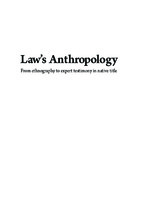Law's Anthropology
From ethnography to expert testimony in native title
| dc.contributor.author | Burke, Paul | |
| dc.date.accessioned | 2013-11-12 00:00:00 | |
| dc.date.accessioned | 2020-04-01T14:54:05Z | |
| dc.date.available | 2020-04-01T14:54:05Z | |
| dc.date.issued | 2011 | |
| dc.identifier | 459356 | |
| dc.identifier | OCN: 994503990 | en_US |
| dc.identifier.uri | http://library.oapen.org/handle/20.500.12657/33698 | |
| dc.description.abstract | Anthropologists have been appearing as key expert witnesses in native title claims for over 20 years. Until now, however, there has been no theoretically-informed, detailed investigation of how the expert testimony of anthropologists is formed and how it is received by judges. This book examines the structure and habitus of both the field of anthropology and the juridical field and how they have interacted in four cases, including the original hearing in the Mabo case. The analysis of background material has been supplemented by interviews with the key protagonists in each case. This allows the reader a unique, insider’s perspective of the courtroom drama that unfolds in each case. The book asks, given the available ethnographic research, how will the anthropologist reconstruct it in a way that is relevant to the legal doctrine of native title when that doctrine gives a wide leeway for interpretation on the critical questions: what is the relevant grouping, what can be counted as a traditional law and when has there been too much change of tradition? How will such evidence be received by judges who are becoming increasingly sceptical about experts tailoring their evidence to suit the party which called them? This book answers these questions by assuming that there is more at stake here than the mere performance of roles. Rather, there is a complex interaction of distinct social fields each with its own habitus, and individual actors are engaged in an active and constructive agency, however subtle, which the painstaking research for this book uncovers. | |
| dc.language | English | |
| dc.subject.classification | thema EDItEUR::J Society and Social Sciences::JH Sociology and anthropology::JHM Anthropology | en_US |
| dc.subject.classification | thema EDItEUR::L Law | en_US |
| dc.subject.other | australia | |
| dc.subject.other | law and legislation | |
| dc.subject.other | anthropology | |
| dc.subject.other | Aboriginal Australians | |
| dc.subject.other | Aboriginal title | |
| dc.subject.other | Broome | |
| dc.subject.other | Western Australia | |
| dc.subject.other | Ethnography | |
| dc.subject.other | Expert witness | |
| dc.subject.other | Land tenure | |
| dc.subject.other | Yawuru | |
| dc.title | Law's Anthropology | |
| dc.title.alternative | From ethnography to expert testimony in native title | |
| dc.type | book | |
| oapen.identifier.doi | 10.26530/OAPEN_459356 | |
| oapen.relation.isPublishedBy | ddc8cc3f-dd57-40ef-b8d5-06f839686b71 | |
| oapen.pages | 326 | |
| oapen.place.publication | Canberra | |
| oapen.remark.public | Relevant Wikipedia pages: Aboriginal Australians - https://en.wikipedia.org/wiki/Aboriginal_Australians; Aboriginal title - https://en.wikipedia.org/wiki/Aboriginal_title; Anthropology - https://en.wikipedia.org/wiki/Anthropology; Broome, Western Australia - https://en.wikipedia.org/wiki/Broome,_Western_Australia; Ethnography - https://en.wikipedia.org/wiki/Ethnography; Expert witness - https://en.wikipedia.org/wiki/Expert_witness; Land tenure - https://en.wikipedia.org/wiki/Land_tenure; Yawuru - https://en.wikipedia.org/wiki/Yawuru | |
| oapen.identifier.ocn | 994503990 |

